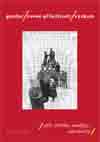K prehistorii českých kolektivních domů
On the prehistory of Czech collective homes
Author(s): Hubert GuzikSubject(s): Gender Studies
Published by: AV ČR - Akademie věd České republiky - Sociologický ústav
Keywords: collective home; housing; garden city
Summary/Abstract: Collective homes and housing collectivization are phenomena that are usually considered to be ideologically close to Marxism or anarchism. In the 19th century, however, socialization of domestic work was part of various ideological streams, from social democrats to the business establishment. At the beginning of the 20th century, various forms of collective housing garnered the attention of the Czech intellectual elite. Information about collective housing came either directly from the United States of America or from Germany and Scandinavia. Czech sociologists regarded it as a contribution to social solidarity; feminists, on the contrary, as an instrument for the reinforcement of the family. The concept of homes with central kitchens came to Bohemia not only as part of a political and economic discourse but also in utopian novels and as part of architectural debates. Czech architecture and literature were, however, reserved about collective housing. The first larger reflection on central kitchens did not appear in Czech architecture until the beginning of the 1920s, on the margins of debates about the garden city. Among feminists, in contrast, we can see an uninterrupted interest in the socialization of domestic work during the entire first four decades of the 20th century. And it was feminists who managed to give the theoretical deliberations a real, albeit very constrained architectural form.
Journal: Gender rovné příležitosti výzkum
- Issue Year: 13/2012
- Issue No: 01
- Page Range: 42-51
- Page Count: 10
- Language: Czech

